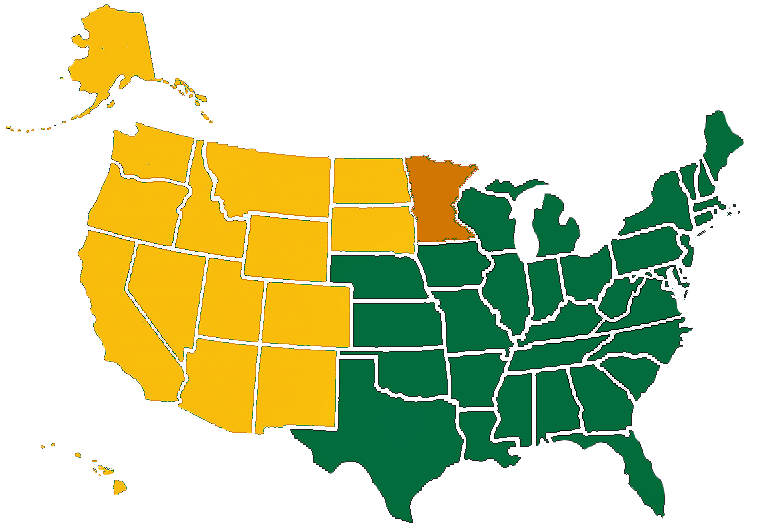Accreditation

NDSU's College of Business maintains the highest possible accreditation—a designation reserved for the top 6% of business schools in the world—awarded through the Association to Advance Collegiate Schools of Business (AACSB).
Contact

Connect with the Graduate Programs Coordinator to start a conversation about your interest in the MBA program.
Email: elizabeth.worth@ndsu.edu
Schedule a meeting (in-person or via Zoom): https://calendly.com/elizabethworth
Fill out the form below to let us know you're interested or to request more information about the MBA program.
Program Delivery
The MBA program is offered in two delivery methods: 1) On Campus/Hybrid, and 2) Online.
- The On Campus-Hybrid MBA program is designated primarily for individuals with limited (less than five years of) professional work experience. Core courses are delivered in-person, with numerous elective options offered in a variety of delivery methods. Students in the on campus/hybrid program typically are enrolled full-time (9 or more credits per semester).
- The Online MBA program is designated solely for individuals with significant (five or more years of) post-baccalaureate professional work experience. Core courses are delivered in a synchronous online format in the evenings, with numerous elective options offered in both synchronous and asynchronous online formats. Students in the online program typically are enrolled part-time (8 or fewer credits per semester).
MBA Curriculum - 30 Credits
The MBA program requires 30 total credits for degree completion: 16 core credits (MBA 701-708) and 14 elective credits. Electives may be satisfied with a mix courses both within and outside of the MBA prefix (subject to approval). All courses with an MBA prefix are worth two (2) credits and are delivered in 8-week (half-semester) sessions during the fall or spring semester.
Required Core Courses (16 credits)
| Course | Title | Typical Semester |
|---|---|---|
| MBA 701 | Strategic Cost Management | Fall |
| MBA 702 | Advanced Financial Management | Spring |
| MBA 703 | Advanced Organizational Behavior | Fall |
| MBA 704 | Supply Chain and Operations Management | Spring |
| MBA 705 | Strategic Marketing Management | Fall |
| MBA 706 | Managing Information Resources | Fall |
| MBA 707 | Microeconomics for Managers | Spring |
| MBA 708 | Advanced Strategic Management | Spring |
Elective Course Options (14 Credits)
MBA-prefixed elective courses are available from within three specific concentration areas, each of which may also be earned as its own stand-alone graduate certificate:
- *Business Analytics (MBA 751-753; 722)
- Digital Marketing and Innovation (MBA 721-724)
- Leadership and Managerial Skills (MBA 731-736)
*The Business Analytics certificate is not currently available to Online MBA students, as MBA 751, 752, and 753 are held in-person.
Students may choose to complete all four courses within a particular concentration or to take a variety of courses from across concentrations. Additionally, students typically may use other graduate courses (600-level or higher) offered by the College of Business toward elective credit requirements. A limited number of approved courses from outside the College of Businses may be used, as well (up to 10 credits).
MBA-Prefixed Elective Courses
Note: Course information listed below is subject to change. Courses may be offered on a rotating schedule.
| Course | Title | Typical Semester |
|---|---|---|
| MBA 721 | Creating and Marketing Innovations | Fall |
| MBA 722 | Marketing Analytics and Customer Intelligence | Spring |
| MBA 723 | Digital Marketing | Fall |
| MBA 724 | Integrated Marketing Communications | Spring |
| MBA 731 | Leading and Managing Teams | Varies |
| MBA 732 | Managerial Leadership: Essential Competencies | Fall |
| MBA 733 | Management Decision Making | Fall |
| MBA 734 | Negotiations | Spring |
| MBA 736 | Managing Conflict in Organizations | Spring |
| MBA 751 | Business Analytics Concepts | Fall |
| MBA 752 | Business Analytics Strategy | Spring |
| MBA 753 | Business Analytics Methods | Fall |
Additional Elective Course Options
In general, any graduate-level course that is offered from within the College of Business can be considered as an MBA elective, as long as the student has not taken the equivalent 400-level undergraduate course. These may include graduate courses (600-level or higher) with any of the following prefixes (in addition to the MBA-prefixed elective courses):
| ACCT (Accounting) | MIS (Management Information Systems |
| BUSN (Business Administration) | MRKT (Marketing) |
| FIN (Finance) | SCM (Supply Chain Management) |
| MGMT (Management) | TL (Transportation and Logistics) |
A variety of courses from other Colleges across the University have been used as electives, as well, including—but not limited to—the following academic areas:
| AGEC (Agribusiness and Applied Economics) | H&CE (Human & Community Education) |
| COMM (Communication) | HDFS (Human Development & Family Science) |
| CED (Community Development) | IME (Industrial and Manufacturing Engineering) |
| CSCI (Computer Science) | PHRM (Pharmacy Practice) |
| CM&E (Construction Management and Engineering) | PH (Public Health) |
| ECON (Economics) | PSYC (Psychology) |
| HNES (Health, Nutrition and Exercise Sciences) | STAT (Statistics) |
*Please note that students may need a course permit and/or permission from the department or course instructor in order to register for courses outside of their home program. Permission is not guaranteed. All courses must be approved for degree audit by the MBA advisor and director, and by the Graduate School, in order to be eligible to count toward MBA degree requirements.
Prerequisite Requirements
Because the MBA degree is structured to serve students from various undergraduate disciplines, a set of foundation course requirements is needed to ensure adequate background preparation. Students should have proficiency in each of the following foundation course areas prior to enrolling in its subsequent MBA core course:
| Proficiency will be determined based upon academic and professional experience, contingent upon review of the applicant's transcript(s) and resume. If it is determined that the applicant is deficient in one or more course areas, they will be given the option to take an approved undergraduate course in that subject (Option 1) or to complete an online, self-paced instructional module (Option 2). Foundation course completion is not required for admission, but rather should occur before the student enrolls in the subsequent MBA course. |
OPTION 1
Most Common for Current Undergraduate Students
| COURSE | NUMBER | SERVES AS A PREREQUISITE FOR: |
|---|---|---|
| ACCT | 200 or 102 | MBA 701 Strategic Cost Management |
| ECON | 105 or 201 + 202 | MBA 707 Microeconomics for Managers |
| FIN | 320 | MBA 702 Advanced Financial Management |
| MGMT | 320 | MBA 703 Advanced Organizational Behavior |
| MRKT | 320 | MBA 705 Strategic Marketing Management |
| STAT | 330 | MBA 704 Supply Chain Management |
OPTION 2
Most Common for Bachelor's Degree Holders/Current Working Professionals
Students wishing to complete an online, self-paced instructional module in order to meet proficiency requirements for one or more of the foundation course areas will be provided with a link to register for the module online. Each module has a fee around $125-150. No course credit is provided for completing these modules.
Contact elizabeth.worth@ndsu.edu for more information.
Admission Requirements
Applications are reviewed on a case-by-case basis using a rolling admission format. The review process is holistic and takes into account all applicable factors, such as past/current CGPA, professional experience, GMAT/GRE score, statement of purpose, letters of recommendation, etc.
An application file must be completed with all required official documents before it can be reviewed for admission. Admission decisions will not be made based upon incomplete application files and/or unofficial documentation.
In order for an application file to be considered complete, the following items must be received by the Graduate School:
- Online Application
- Statement of Purpose + Resume
- Three (3) Letters of Recommendation
- $35 Application Fee
- Official Transcripts (from all institutions previously attended)
- Official GMAT or GRE score*
- Proof of English Proficiency**
Application Instructions
* Official GMAT or GRE Score
Applicants who wish to be considered for a GMAT/GRE exam waiver must make this request with the MBA admission committee.
GMAT/GRE exam waivers are never guaranteed, but rather are considered on a case-by-case basis. Decisions are made at the sole discretion of the MBA admission committee.
Examples of criteria that might qualify an individual for consideration of an exam waiver include the following:
- Applicant has a cumulative post-secondary GPA of 3.5 or higher from accredited or otherwise recognized institutions of higher education
- Applicant has successfully completed two or more post-secondary degrees (bachelor's level or higher)
- Applicant has substantial post-baccalaureate professional work experience (typically a minimum of five years) and demonstrated leadership ability
** Proof of English Proficiency
May be met in one or more of three ways:
- Raised in a country in which English is the only official language
- Earned a bachelor's degree or higher from a recognized institution within a country in which English is the only official language; or
- Official English language test score—TOEFL ibt 71 or higher, IELTS academic 6.0 or higher; PTE academic 50 or higher; or Duolingo 100 or higher.
Cost
2024-2025 MBA Tuition & Fee Costs
Tuition Rate | In-State/Online Rate |
| Out-of-State Rate | Non-U.S. Rate |
|---|---|---|---|---|
Per Credit | $705.64 | $878.15 | $1025.11 | $1184.84 |
Approximate Program Total | $21,170 | $26,345 | $30,750 | $35,545 |
Map Key |
|
|
|
|

Various resources may be available to help cover program costs.
Common examples include:
| Employer Support | Scholarships | Graduate Assistantships | Federal Financial Aid (FAFSA) |
|---|---|---|---|
Many companies offer tuition reimbursement or other forms of financial assistance for their employees. Check with your supervisor or HR department top find out what educational benefits you may be eligible to use toward your degree. This is the most common way that MBA students help cover program costs. | A very limited number of scholarships may be available to graduate students. Applications are open from November 1st to March 1st each year for students to apply for awards that would disburse during the following academic year. | Graduate assistantship positions are exceptionally limited and awarded on a competitive, case-by-case basis (if available). Generally, no funding is offered at the time of admission. Current and incoming/admitted MBA students may be notified if a position becomes available and provided with application information at that time. Students with a graduate assistantship postition will receive a one- or two-semester contract to provide research and/or teaching assistance for 10, 15, or 20 hours per week in exchange for a waiver of the graduate base tuition rate and a modest stipend. | Domestic and permanent resident students may be eligible to receive federal financial aid and/or need-based scholarships by completing the FAFSA. |


